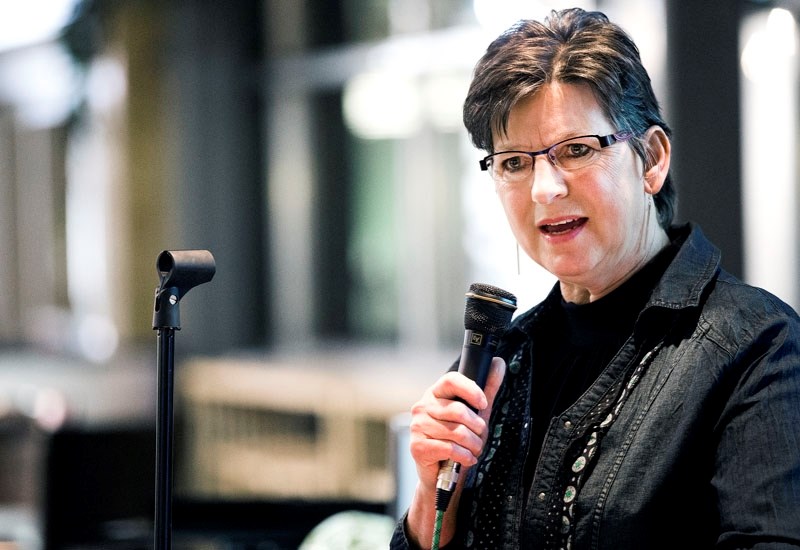No one could even tell Goldilocks-the-chicken was a secret guest at Thursday’s urban agriculture talk until it was time for her debut.
Yolande Stark of Tipi Creek Family Farm brought Goldilocks along to the gathering at the Enjoy Centre as part of her discussion about what’s needed for chicken care. The chicken didn’t make a sound until she was brought out of her carrier, and after that sat quietly in Stark’s arms allowing the crowd to pet her.
The Stark family operates a community shared agriculture program. They also keep a mixed flock of about 50 chickens at their farm just west of Villeneuve. As St. Albert residents gear up for an upcoming council discussion on the idea of allowing backyard hens in the city, Stark was asked to give attendees some food for thought about what’s involved in keeping chickens.
“We have backyard chickens, it’s just that our backyard’s bigger than most,” she said.
Stark said as she was preparing to give the talk, part of the urban agriculture conversation series, she heard four main questions.
Aren’t chickens noisy? Don’t they smell bad? What happens when people decide to give them up? What happens when a chicken dies?
“A few chickens in a yard, that’s not very noisy,” she said. “If they’re in a safe environment, safe from predators, they’re not going to be noisy.”
Roosters are the noisy ones, she said, not hens. Hens mostly cluck or cackle, unless they’re frightened.
Chickens can smell, she said, but when they smell the worst is when they’re concentrated on a chicken farm. A handful of chickens, well cared for, “they’re not more offensive in smell than a cat or dog.”
She predicted that animal rescues would not be flooded with unwanted urban hens. It’s expensive to get set up, she said, and in some communities where urban hens are allowed would-be chicken keepers have to demonstrate knowledge of raising them.
Generally, it seems those venturing into backyard chickens are serious about it, she said. If someone does decide to get rid of their hens, she said she believes there would probably be people willing to take them in.
If chickens die, it depends on the community’s bylaw, but research done for the talk showed the suggestion is to double bag the body and put it in the garbage or to take it to a vet for disposal. Burial can attract predators, she said.
Stark also outlined what she thought are the basic needs for urban hens, including safe housing, food and clean water.
With the coop, she emphasized ensuring that Alberta’s cold winters and hot summers are taken into consideration.
Make sure the door is secure, Stark said, and the birds need to have perches.
There should be a feeding station. Laying boxes are necessary as hens like to have a private place to lay eggs.
“It’s really important to keep your coop clean,” she said.
A secure outdoor area is also necessary, she said.
“The more space your chickens have, quite likely the happier they will be,” she said.
Stark reminded the crowd that chickens can fly, which is why they need an enclosed run. In fact, Goldilocks, the guest star of the show, had attempted to fly the coop just that morning. Clipping the flight feathers should help keep escaping hens closer to home.
A well-balanced diet is of upmost importance, she said.
The birds also enjoy treats, often in the form of kitchen scraps, but she cautioned that treats should be limited.
“Nothing makes chickens happier than getting an unexpected morsel,” Stark said.
Fresh water is vital, she said, and her chickens also enjoy snow to peck at during the winter.
Of course, the benefit of keeping chickens is the eggs. She noted that a good laying hen will produce between 200 and 300 eggs a year, depending on a number of factors. Productivity will decrease as the hens get older, she said.
Thursday’s chicken talk was part of an ongoing urban agriculture discussion series. There is a Facebook group, St. Albert Urban Agriculture Conversation, where people can get more information about urban agriculture and St. Albert.




